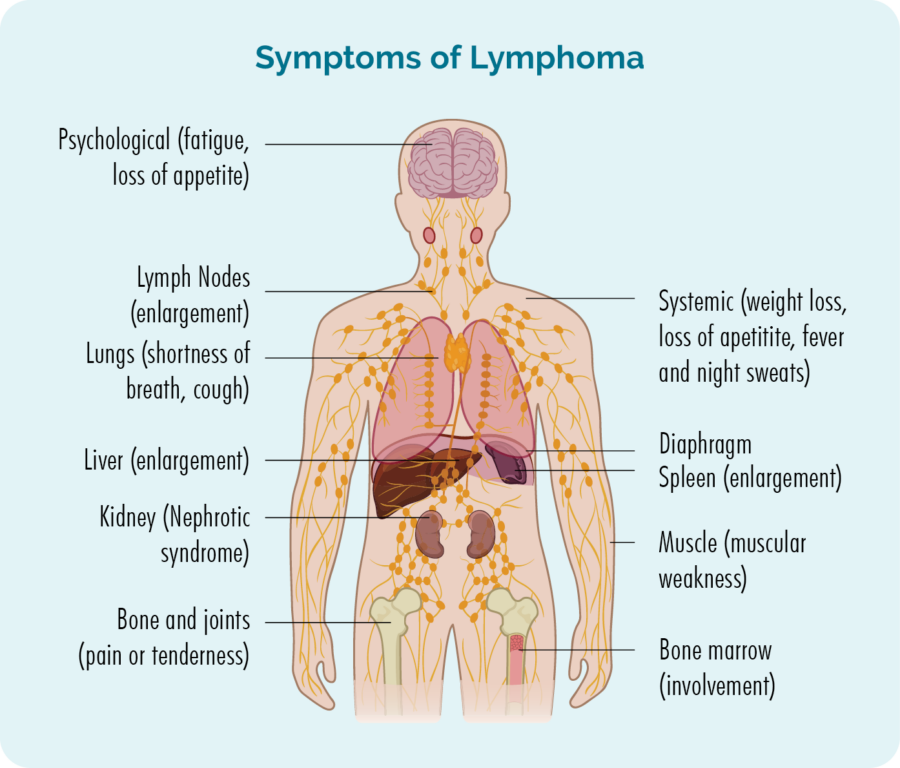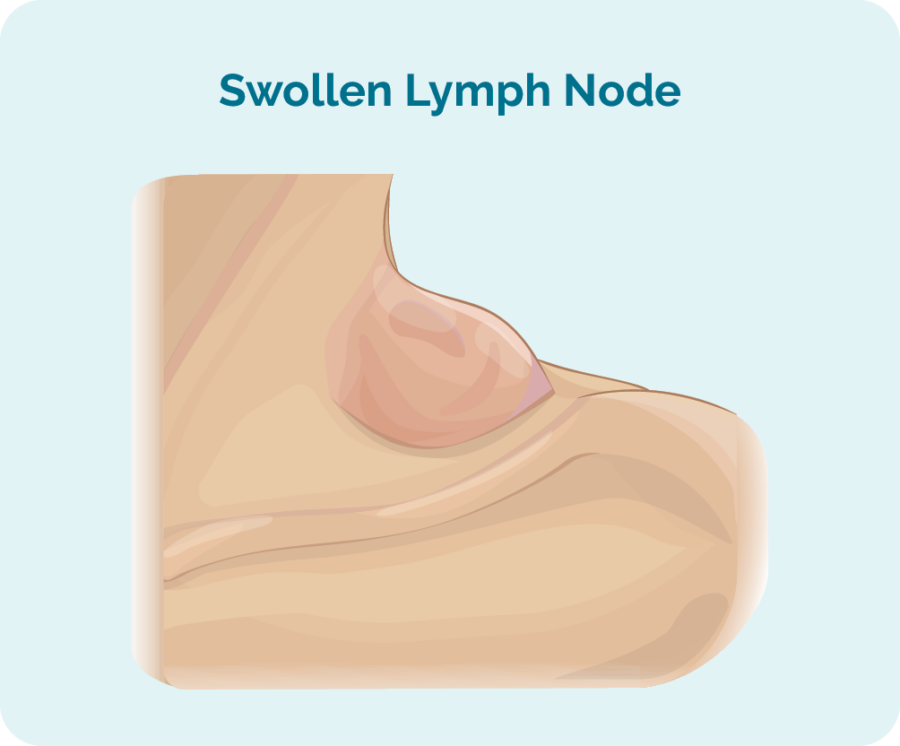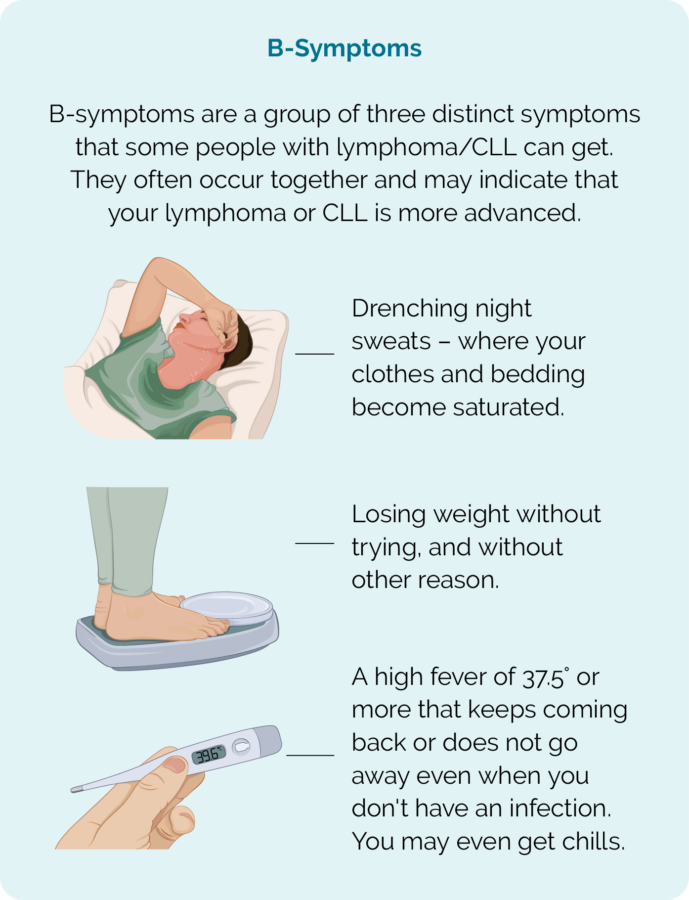Symptoms of lymphoma are often vague, and similar to symptoms of other illnesses such as infections, iron deficiency and autoimmune diseases. They can also be similar to side-effects from some medications. This makes diagnosing lymphoma tricky sometimes, especially for indolent lymphomas that are often not growing quickly.
Additionally, there are around 80 different subtypes of lymphoma including Chronic Lymphocytic Leukemia (CLL) and symptoms can be different between subtypes.
It is more common for symptoms to be related to something other than lymphoma. However, with around 7400 people in Australia being diagnosed with lymphoma or CLL each year, it is worth being aware of. If your symptoms improve after a few weeks, it is unlikely to be lymphoma. With lymphoma, symptoms usually continue past two weeks and can get worse.
An example of this is a swollen lymph node (or gland) that swells up. This is a very common symptom that can happen with different types of infection, sometimes even before we know we have an infection. In this case, the lymph node usually goes back to normal size within two or three weeks. However, if you have a lymph node that remains bigger than usual, or continues to get bigger it is worthwhile asking “Could this be lymphoma?”.
Understanding what lymphoma is, and what the symptoms are can help prepare you for asking the right questions when you go to your doctor such as:
- Could this be lymphoma?
- Can I have an ultrasound or CT scan to check?
- Can I have a biopsy?
- Where can I get a second opinion?
Common symptoms of lymphoma
Indolent lymphomas are slow growing and can develop over many months to years before showing any symptoms. It can be easy to miss symptoms or explain them away to other causes when your lymphoma is indolent.
Some people may not have any symptoms at all, and are diagnosed accidentally when having a scan for another medical condition.
If you have an aggressive (fast-growing) lymphoma, you will likely notice your symptoms as they develop over a short period of time, such as days to weeks.
Because lymphoma can grow in any part of your body, there are many different symptoms you may experience. Most will be related to the part of your body affected by lymphoma, but some can affect you more generally.

Swollen lymph nodes
Swollen lymph nodes are a common symptom of lymphoma. But they are also a symptom of other illnesses such as bacterial or viral infections.
Swollen lymph nodes caused by infection are usually painful and disappear within two to three weeks. Sometimes when you have a virus they may last longer than a few weeks.
Swollen lymph glands caused by lymphoma are commonly found in the neck, groin and armpit. However we have lymph nodes throughout our bodies so they can be swollen anywhere. We usually notice the ones in our neck, armpit or groin because they are closer to our skin.

About lymph Nodes
Lymph nodes are usually smooth, round, mobile (move when you touch or press on them) and have a rubbery texture. Swollen lymph nodes in lymphoma do not go away after a few weeks and may continue to get bigger. This is because the cancerous lymphoma cells gather and build up in the lymph nodes.
In some cases, the swollen lymph may cause pain, but often there is no pain. This will depend on the location and size of your swollen lymph nodes.
It is important to note, that in some subtypes of lymphoma, you may not notice any swollen lymph nodes.
No one likes a lump
Fatigue

Fatigue related to lymphoma is different to regular tiredness. It is an overwhelming exhaustion for no obvious reason. It is not relieved by rest or sleep, and often affects simple tasks such as getting dressed.
The cause of fatigue is not known, but could possibly be due to cancer cells using our energy to grow and divide. Fatigue can be caused by other reasons too such as stress and other illnesses.
If there does not seem to be any reason for your fatigue, go to your doctor to get a checkup.
Unexplained weight loss
Unexplained weight loss is when you lose weight over a short period of time without trying. If you lose more that 5% of your body weight in 6 months you should see your GP to to get checked, as this can be a symptom of lymphoma.
Weight loss happens because cancerous cells use up your energy resources. Your body also uses up extra energy to try and get rid of the cancerous cell.

Examples of 5% weight loss
If your normal weight is: | 5% weight loss would be: |
50 kg | 2.5 kg – (weight down to 47.5 kg) |
60 kg | 3 kg – (weight down to 57 kg) |
75 kg | 3.75 kg – (weight down to 71.25 kg) |
90 kg | 4.5 kg – (weight down to 85.5 kg) |
110 kg | 5.5 kg – (weight down to 104.5 kg) |
Night sweats
Night sweats are different to sweating because of hot weather or warm clothing and bedding. It is normal to sweat in the night if your room or bedding is making you too hot, but night sweats can happen regardless of the weather, and cause your clothing and bedding to become drenched.
If you have night sweats because of lymphoma, you may need to change your clothing or bedding during the night.
Doctors do not know exactly what causes night sweats. Some ideas on why night sweats may happen include:
Lymphoma cells can make and send out different chemicals into your body. These chemicals can affect the way your body regulates your temperature.
When lymphoma is growing quickly, it can use up a lot of your energy stores. This extra use of energy can result in your body's temperature rising excessively.
Unexplained persistent fevers
Fever is the rise in your body temperature above the normal level. Our normal body temperature is around 36.1 - 37.2 degrees Celsius.
It is not normal to have regular temperatures of 37.5 degrees or higher. Fevers because of lymphoma may come and go over several days or weeks without any other cause, such as infection.
Lymphoma causes fevers because the lymphoma cells produce chemicals that change the way your body regulates your temperature. These fevers are usually mild and can come and go.
Contact your doctor to let them know if you are getting regular temperatures like this.
Difficulty getting over infections
Lymphocytes are white blood cells that support your immune system by fighting infection and disease, and helping to destroy and remove damaged cells. In lymphoma, lymphocytes become cancerous lymphoma cells and are unable to do their job properly. This makes you more likely to get infections and your infections may last longer.
Itchy body
Many people with lymphoma can get itchy skin. This is often around the same area where your lymph nodes are swollen or, if you have a subtype of cutaneous (skin) lymphoma, you can be itchy anywhere affected by the lymphoma. In some cases, you may feel itchy all over your body.
It is thought itchiness is due to chemicals being released by your immune system, as it tries to fight the lymphoma cells. These chemicals can irritate the nerves in your skin and make it itch.
B-symptoms?
B-Symptoms
B symptoms are what doctors call certain symptoms. These symptoms are often talked about when lymphoma is being staged. Staging is the period before treatment starts where scans and tests are done to work out where the lymphoma is in your body. The symptoms that are called B symptoms include:
- Night sweats
- Persistent fevers
- Unexplained weight loss
Doctors will consider these symptoms when they are planning your treatment.
Sometimes you might see an extra letter added to the stage of your lymphoma. For example:
Stage 2a = Your lymphoma is only above or below your diaphragm affecting more than one group of lymph nodes – And you have no B-symptoms or;
Stage 2b = Your lymphoma is only above or below your diaphragm affecting more than one group of lymph nodes – And you have B-symptoms.

How does the location of the lymphoma affect your symptoms?
Different subtypes of lymphoma show themselves themselves differently. Your symptoms can be be specific to the location of the lymphoma, but also very similar to symptoms in other diseases or infections. The table below outlines some of the symptoms you may experience, based on the location of your lymphoma.
Location of lymphoma | Common symptoms |
Stomach or bowel |
|
Lungs | Often you will have no or few symptoms but you may have cough, shortness of breath, coughing up blood or chest pain. |
Salivary glands |
|
Skin | Skin changes can develop in one place, or in several places around your body. These changes happen over a long period of time, so may not be very noticeable.
|
Thyroid gland | You may notice a lump (swollen lymph node) on the front of your neck or have a hoarse voice. You can also get shortness of breath and have trouble swallowing (dysphagia). If your thyroid gland is underactive, you may:
|
Bone Marrow | Blood cells are made in your bone marrow before moving into your blood stream. Some white blood cells such as lymphocytes are made in your bone marrow, but then move into your lymphatic system. If your bone marrow is affected by lymphoma, you will have a build up of cancerous lymphoma cells in your bone marrow. This means there is less room for other blood cells to be made. Symptoms of lymphoma in your bone marrow can include: Bone Pain – as the inside of the bone and bone marrow swell due to increased cancerous cells gathering there. Low Blood counts
|
Spleen | Low Blood counts
Abnormal Proteins These proteins clump together when you get cold, leading to:
|
Central Nervous System – including your brain and spinal cord |
Less obvious symptoms may include:
|
Eyes |
|
What should I do if I have symptoms of lymphoma?
It is important to understand that all the above symptoms may be caused by many other less serious conditions. However, if you have any concerns, or if your symptoms last longer than a couple of weeks, contact your GP or specialist. Additionally, if you are getting B-symptoms, you should also contact your doctor to let them know.
Your doctor will likely do a physical examination and ask you about your symptoms and other health history, to decide if more tests such an ultrasound, CT scan or ultrasound are needed.

